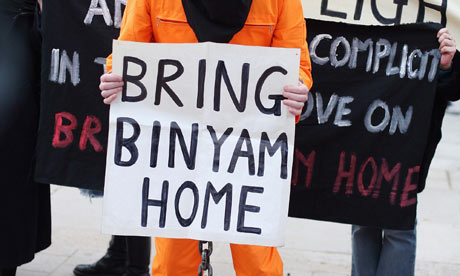
Protest in support of Guantanamo detainee Binyam Mohamed outside the American Embassy, London, February 17, 2009. Photograph: Dan Kitwood/Getty Images
Confidential documents showing the flight plans of a CIA "ghost plane" allegedly used to transfer a British resident to secret interrogation sites around the world are to be made public. The move comes after a Sussex-based company accused of involvement in extraordinary rendition dropped its opposition to a case against it being heard in court.
Lawyers bringing the case against Jeppesen UK on behalf of the former Guantánamo Bay detainee, Binyam Mohamed, claimed last night the climbdown had wide-ranging legal implications that could help expose which countries and governments knew the CIA was using their air bases to spirit terrorist suspects around the world.
Jeppesen UK, a division of the Jeppesen Corporation, a wholly-owned subsidiary of Boeing, is alleged to have provided a range of services that allowed planes owned by shell companies operating on behalf of the CIA to fly suspected terrorists to "black sites" .
Jeppesen is alleged to have provided flight planning services, secured permits for travel, arranged fuel provision and filed flight plans for the clients in the knowledge that the planes were being used for extraordinary rendition.
"Jeppesen's embarrassing U-turn vindicates our fight to expose corporate collusion in torture," said Clive Stafford Smith, director of the legal charity Reprieve, which has led the campaign on behalf of Mohamed. "Binyam Mohamed, and perhaps many others, are one step nearer to making the directors of companies stop and think before they commit criminal acts for profit."
According to an affidavit signed by a former employee, Jeppesen's managing director, Bob Overby, told his staff that "we do all the extraordinary rendition flights". Sean Belcher, a former technical writer for the company, said Overby claimed that the CIA "spared no expense" when it came to paying for Jeppesen's services.
Jeppesen contends there is "no basis" to the claims against it. But after Mohamed's London lawyers, Leigh Day & Co, presented a large volume of evidence - running to 419 pages - which they claim proves the company's involvement in the rendition process, the British arm of the firm withdrew its attempt to have the case struck out.
In a letter to Mohamed's lawyers, Jeppesen's legal representatives, Allen & Overy, state: "Our client... has undertaken an extensive review of information in order to address and rebut your client's evidence. During the course of this exercise it has become apparent that due to the scope and diffuse nature of the evidence... there is a real risk that the hearing of our client's application will descend into a 'mini-trial'... In these circumstances, we consider that the most appropriate and proportionate course is for our client to withdraw its application and for the claim to proceed to trial in the normal way."
A separate case is being pursued against Jeppesen in the US by the American Civil Liberties Union and Reprieve. The US government is seeking to have the case against Jeppesen dismissed, saying it would breach national security. But Jeppesen UK's decision to drop its opposition to fighting the case in a British court means a wealth of confidential information relating to the alleged rendition process will become public.
"We want to know whether Jeppesen UK participated in Binyam's rendition which led to his torture," said his barrister, Daniel Leader. "It is right they should now disclose all the relevant evidence so we can get to the truth."
Mohamed, an Ethiopian who lived in Britain, was arrested in 2002 in Pakistan and handed to the US. He alleges that before his transfer to Guantánamo Bay he was held in prisons in Pakistan, Morocco and Afghanistan, beyond the reach of law. While in Morocco, he alleges that interrogators tortured him by using blades to cut his penis and chest.
Reprieve's renditions investigator, Clara Gutteridge, said the CIA could not have acted alone and the case would raise questions over which governments were complicit in extraordinary rendition.
Jeppesen did not return calls.